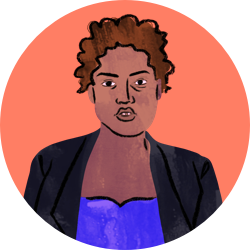Ask The Advocates: Coping With Lupus Flares
Lupus flares can cause swelling, skin rashes, and pain. Flares can also take a heavy toll on mental health. Many people living with lupus are silent warriors who feel uncomfortable sharing their journeys. Because of this, we asked our advocates to tell us how they cope with flare symptoms. By sharing advocates' tips and tricks, we hope to help others know they are never alone. Here is what the advocates shared:
Find the cause of flares

"Coping with a flare can be difficult at times because we aren’t sure of the cause. If I am unsure of the cause, I take time to step back and look back and try to determine if I’m flaring because I pushed myself too hard physically. Or because I am sick. Or simply because lupus flares just happen and don’t always have a reason. Oftentimes, for me at least, determining the cause is a BIG part of treating the flare." – Amber B.
Rest, heat, and medicate
"Once I’ve done that, the things that seem to work the best for me are the gold standards if you will. Resting and trying to give my body the time it needs to heal and overcome the flare. Apply heat, either via a heating pad or hot Epsom salt baths, to ease the pain and help soothe my sore and tired body. Taking ANTI-inflammatories to help reduce any inflammation I may be dealing with. As well as taking any prescribed meds for pain. Some find help in steroids, but for me, they do more harm than good. But the most important thing for me is to let my body rest and heal from the inside out." – Amber B.

"The most important way I cope during lupus flares is by resting. Sometimes I will use steroid medications or breakthrough pain medications on the worst days. Getting help is essential, along with having a great book or TV show to help distract from the pain or fatigue. Flaring can be very discouraging and hard to endure, so I do my best to stay calm by doing comforting things like taking a bath or meditating." – Ava
Lifestyle changes and meditation

"I cope with lupus flares by getting a lot of rest. Taking warm baths for my joints. I will also use better dieting to help cope with my flares. I realized that what we eat can make us flare. I also started to exercise every morning to make sure I help my body get through the day, but I also make sure I take naps throughout the day also." – Jokiva B.

"I cope with lupus flares with meditation, essential oils, and healthy eating and exercising. I always keep a positive attitude and I remove stress by saying no to negative things and negative people. I work hard at protecting my own energy and have had to learn to keep my focus on fighting hard to survive and thrive beyond lupus." – Racquel D.
Mental health support
"One thing many don’t include when talking about lupus flares is the toll they can take on your mental health. That is just as important as our physical health. If we feel like our mental health is taking a hit we need to do something about that as well. For me, that looks like journaling or reaching out to a friend who also has lupus. Talking to someone who understands the ins and outs of lupus is so helpful. In the end, coping with a flare will look different from person to person but we all need to remember to rest when our bodies need it. And to treat our mental health as well as our physical health." – Amber B.
Find what combination works for you

"This is generally how I deal with a lupus flare:
- Take an extra dose of prednisone as directed by my rheumatologist.
- Cancel any plans that I can for the day to alleviate stress, which can make the flare worse.
- Ask for support from my spouse in taking on household chores or baby duties.
- Rest as much as possible.
- Eat as healthy as possible and stay hydrated." – Gabrielle D.

Join the conversation